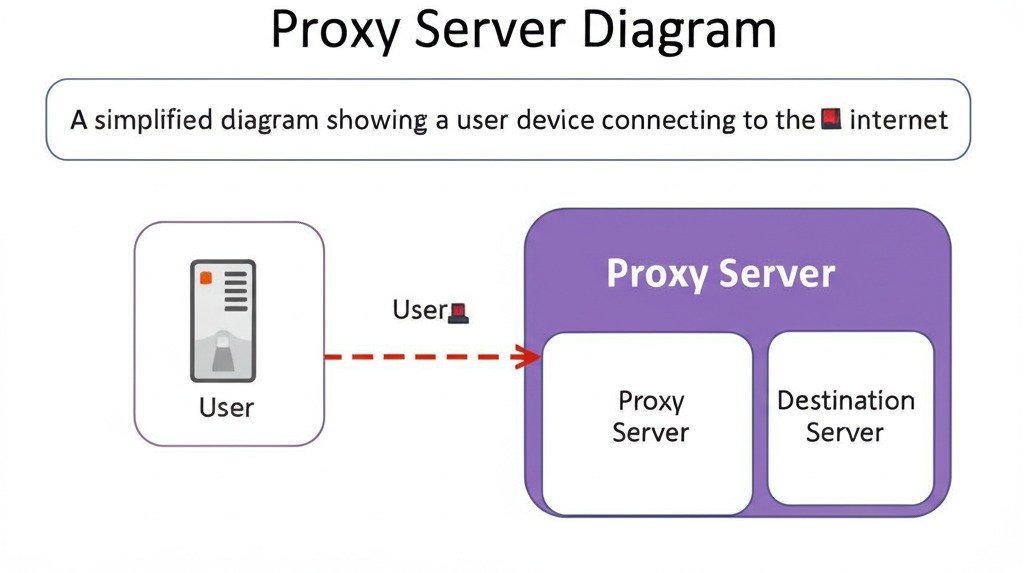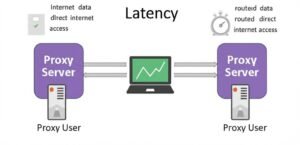So, you’ve probably heard a lot about proxies and their ability to speed up the internet. Maybe you’re wondering if using one might help you speed up your connection, especially when you’re stuck in a slow browser or a laggy connection. I’ve been in that exact position, feeling the frustration when pages take forever to load or streaming quality drops in the middle of a movie. But does a proxy speed up the internet? Let’s break it down.
Key Points to Know:
- Proxy servers can sometimes speed up Internet browsing, but not always.
- Caching and load balancing are two key ways that proxies can enhance speed.
- Low-quality proxies or far-away servers can slow things down instead.
What is a Proxy Server?
Before diving into whether a proxy can speed up your internet, let’s first make sure we’re all on the same page about what a proxy server is. Think of a proxy as a middleman between you and the internet. When you connect to a website, your traffic doesn’t go directly from your device to the site. Instead, it goes through the proxy server first. This server sends your request to the website and then relays the response back to you.
You might think of it as if you’re sending a letter through a friend who knows a shortcut to the post office. While this friend may help deliver your letter faster, if they’re too far away or take a longer route, it might slow things down.
How Do Proxy Servers Work?
The basic purpose of a proxy server is to act as a gateway between you and the internet. It can handle a variety of tasks such as:
- Traffic Management: When you send a request to a website, the proxy checks if the content is already stored in its cache. If it is, it’ll serve the cached content, which can load much faster than fetching it from scratch.
- Load Balancing: Some proxies can distribute web traffic across several servers. This is particularly helpful in high-traffic scenarios, such as during a major online sale or a live event. By spreading the requests out, proxies can reduce congestion and improve loading times.
- Privacy and Security: Proxies also hide your real IP address, adding a layer of anonymity when browsing. Though this doesn’t directly speed up your connection, it does add value in terms of privacy and security.
Does a Proxy Speed Up the Internet? Factors That Can Impact Speed
Now, here’s the million-dollar question: Does a proxy speed up Internet browsing? The answer isn’t always black and white, but here are a few key factors to consider.
Proxy Caching
One of the ways proxies can speed up your internet is through caching. When you visit a site for the first time, it might take a little longer to load. But when you visit it again, the proxy can pull the page from its cache instead of reloading everything. This drastically reduces loading times.
For example, when I started using a proxy for my work, I noticed that pages I visited often loaded much faster. I didn’t have to wait for the whole page to load again, and this improved my browsing experience.
Load Balancing
Another reason a proxy might speed up your internet is through load balancing. When you access a site through a proxy, it might redirect your request to the server with the least traffic or optimal performance. In cases where websites experience a lot of traffic, this can help avoid slowdowns and improve overall browsing speed.
Imagine a busy restaurant where only one waiter is handling all the orders. You’d probably have to wait a while for your food. But if multiple waiters are managing different sections of the restaurant, your wait time will be reduced, making the whole process faster.
Bypassing ISP Throttling
This might not be something most people think about, but if your internet service provider (ISP) is throttling or slowing down your connection to certain websites (like streaming platforms), a proxy can sometimes help bypass that throttling. By routing your traffic through a proxy server, it might avoid the specific restrictions your ISP has put in place.
I had a friend who noticed their Netflix streaming was often blurry or laggy during peak hours. After switching to a proxy server, their streaming experience improved, because the proxy helped avoid throttling issues set by the ISP.
Additional Latency
While proxies can offer several benefits, they do come with one big potential drawback: latency. When you use a proxy, there’s an extra step in your connection. Instead of going straight from your device to the website, your traffic goes through the proxy server first. This can cause delays, especially if the proxy server is far away or not optimized for speed.
For example, I once tried using a proxy that was located across the world. The connection was noticeably slower, and I felt like I was back in the dial-up days. A faster, closer proxy server would have made a difference.
When Can a Proxy Slow Down Internet Speed?
While a proxy can sometimes speed up your connection, it can also slow it down in certain scenarios. Here’s why:
Increased Latency
As mentioned earlier, using a proxy adds an extra hop to your connection. The more hops your traffic has to make, the slower the connection can become. If the proxy server isn’t close to you, or if it’s overloaded with requests, this can really drag your internet speed down.
Low-Quality Proxies
Not all proxies are created equal. Some low-quality or free proxies can be extremely slow. They often have limited bandwidth, which means they can only handle a small amount of traffic at a time. If you’re using a free proxy, you may experience significant slowdowns simply because too many people are using it at once.
Proxy Server Location
The location of your proxy server matters. If your server is located in a different country, the added distance can introduce delays. Think of it like this: the farther away your friend is, the longer it takes for them to deliver your letter to the post office.
How to Choose the Best Proxy for Faster Internet
If you’re set on using a proxy to speed up your connection, it’s important to choose the right one. Here’s what to look for:
- Low Latency Servers: Look for proxies that have servers closer to your location. The less distance the data has to travel, the faster it will get to you.
- High-Quality Providers: If you want to avoid the slowdowns that come with free proxies, go for a reliable, paid proxy service. They’re usually faster, more secure, and offer better performance.
- Caching Capabilities: Some proxies are optimized for caching, which will help speed up your browsing, especially if you visit the same websites regularly.
Proxy vs VPN: Which One Offers Better Internet Speed?
At this point, you might be wondering: Should I use a proxy, or is a VPN a better choice for speed?
Here’s the deal: while both proxies and VPNs reroute your internet traffic, a VPN adds an extra layer of encryption, which can slow things down. Proxies, on the other hand, don’t usually encrypt your traffic, so they can be faster in certain cases. However, if privacy is a priority for you, a VPN is the better choice, even if it’s a bit slower.
Conclusion: Can Proxies Improve Internet Speed?
In summary, proxies can speed up your internet connection, but it depends on several factors, such as the quality of the proxy, its location, and how much traffic the server handles. Caching and load balancing are two key ways a proxy can improve speed, but latency and proxy quality can sometimes slow things down.
If you’re looking to improve your internet speed, a well-chosen proxy might just do the trick, but it’s important to pick a reliable one. Don’t expect miracles from free proxies—sometimes, they’re more trouble than they’re worth. And remember, a proxy might help with browsing, but if you need full privacy and encryption, a VPN could be a better choice.
FAQs
- Does using a proxy speed up my internet?
Yes, a proxy can speed up your internet by caching content and distributing traffic efficiently, but its impact depends on the quality of the proxy and its server location. - Will a proxy make my connection slower?
In some cases, proxies can introduce additional latency, especially if the server is far away or overloaded, causing slower speeds. - How can proxies bypass ISP throttling?
Proxies can bypass ISP throttling by masking your traffic and routing it through different servers, helping avoid speed restrictions. - Are free proxies fast?
Free proxies are often slower because they have limited bandwidth and too many users. Paid proxies tend to offer better performance. - Does a proxy encrypt my data?
No, proxies don’t usually encrypt your data. If you need encryption for security, you should consider using a VPN instead. - Can proxies improve streaming speed?
Yes, if your ISP is throttling streaming services, a proxy might help you stream without interruptions or lower quality. - How do I choose the best proxy for speed?
Look for a high-quality, paid proxy with low latency, fast servers, and good caching capabilities for the best speed improvement.
Learn how proxies can speed up your internet by improving load times, bypassing throttling, and optimizing traffic. Boost your browsing speed today!

i want to write a author box bio, my site based on ppmcalculator.com. provide me a short Biographical Info
2/2



